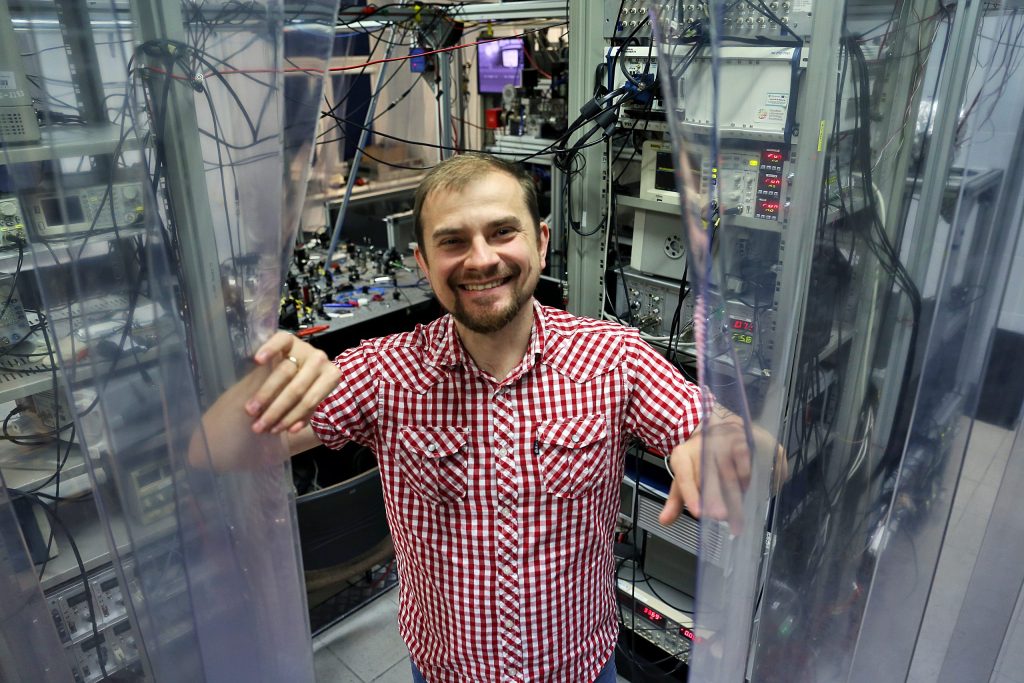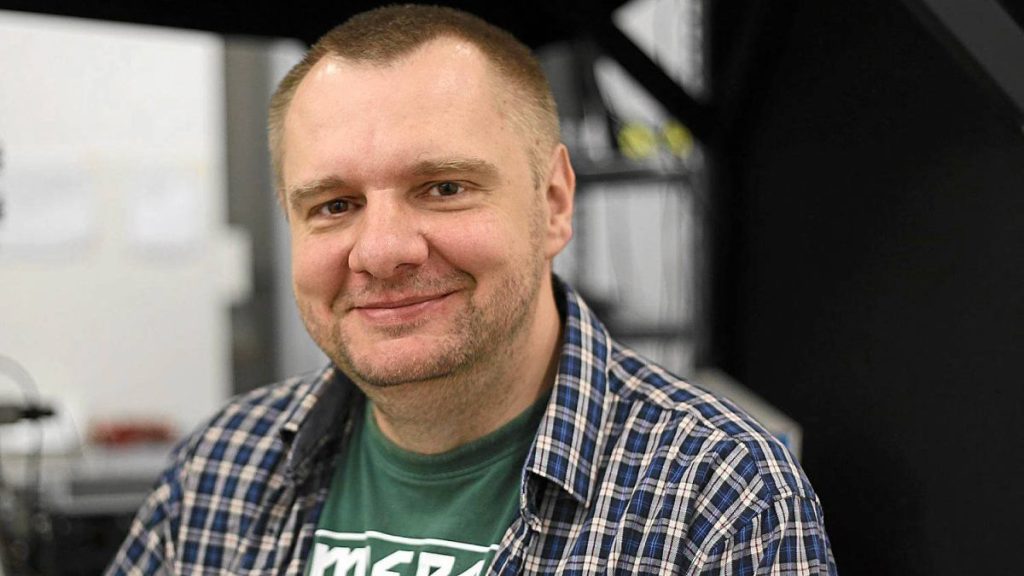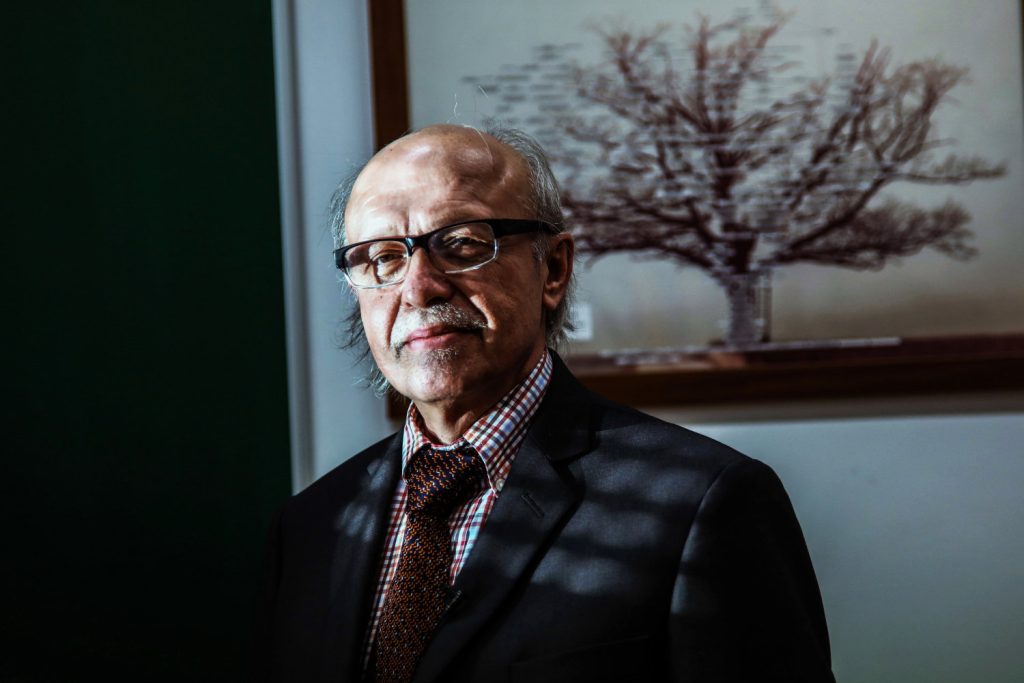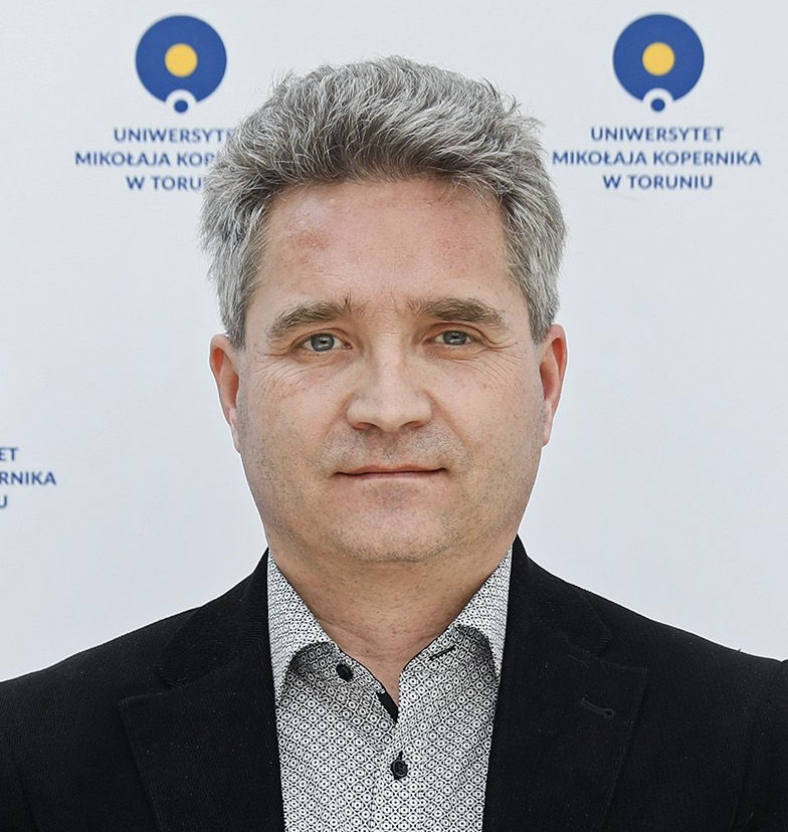Astrophysics and Astrochemistry
Director of the Center: Piotr Żuchowski, Ph.D., professor at NCU
The main research areas of the Centre include astrophysics, quantum chemistry and theoretical spectroscopy, all of which focus on providing insights into the more in-depth understanding of the formation process of planets, stars and galaxies evolving from interstellar matter. The Centre has two groups which in a complementary way, explore the life cycle of matter in the Universe.
- “TASQ Force” Group.
The scientific motivation of this interdisciplinary group is to achieve remarkable progress in astrochemistry, a dynamically developing new discipline of knowledge. Astrochemistry is a science that examines particles and their properties to describe astronomically relevant objects. The development of astrochemistry is essential to understand physical and chemical processes taking place in the areas of star and planet formation, and thus to determine the conditions for the formation of astronomical objects and the beginnings of life. Over 200 molecules have been discovered in the Cosmos so far, including complex organic compounds. However, it is not the discovery itself that is most important, but the fact that their observation is the primary source of information about the existing conditions and processes taking place in different areas of the Universe. To fully make use of the data collected by state-of-the-art measuring devices, such as ALMA (Atacama Large Milimeter/Submilimeter Array) or JWST (James Webb Space Telescope), it is crucial to have precise information about various physical and chemical properties of particles and how they interact with each other. Obtaining relevant data from an experiment is usually very difficult, or even impossible; therefore, reliable and effective methods of calculation are crucial. - “Galaxy Evolution and Structure” Group.
The scope of the group’s research includes examining a range of complementary topics on star astrophysics, extrasolar planets, interstellar centre, dark matter and galactic evolution. The theme that joins these areas is the complex cycle of the evolution of matter in the Universe. Under the influence of gravity in our expanding Universe, the gravitational collapse of heterogeneous densities of matter occurs, which leads to the formation of dark matter halo. The loss of angular momentum, the cooling of matter and the formation of central densities of baryonic matter lead to the formation of molecular clouds within which stars and planets reside. Stars form heavy elements in their centres, and during the final stages of their evolution, they deposit them into the core, which becomes the building block for subsequent generations of stars and planets. On large scales, gas accretion in galaxy centres results in the formation of supermassive black holes and active galactic nuclei.
The defining characteristic of the Centre is the internal integration of astronomers, chemists and physicists from the Nicolaus Copernicus University and the strong international cooperation of these groups with renowned scientific centres around the world through several joint projects.

PhD. Piotr Żuchowski, Prof. UMK a graduate of the Interdepartmental Individual Mathematical and Natural Sciences Studies at the University of Warsaw, he defended his doctoral thesis at the Faculty of Chemistry of the UW in 2007. In 2007-2011, he held postdoctoral fellowships in the UK at the Universities of Durham (as Research Associate) and Nottingham (Research Fellow at the School of Chemistry). He has worked at UMK since 2011 as an Assistant Professor, and since 2017 as an Associate Professor. He is the winner of the Homing Plus return scholarship from the Foundation for Polish Science, the manager of several grants from the National Science Center, and the Ministry of Science and Higher Education. In 2012, he was honored with the Scholarship for Outstanding Young Scientists. In 2015 and 2018, he received the UMK Rector’s First Degree Award for Scientific Activity. In 2020, he was honored with the Award of the Minister of Science and Higher Education for significant scientific achievement. He has co-authored more than 60 scientific publications, including in the most prestigious physics and chemistry periodicals such as Nature Chemistry, Nature Physics and Physical Review Letters. Supervisor of 4 doctoral students (one doctoral student has already received a PhD), he supervised three postdoctoral trainees. In 2020, he was elected to the Committee on Physics of the Polish Academy of Sciences for a four-year term. Prof. Zhukovsky is scientifically engaged in the theory of intermolecular interactions, both in the development of new theoretical methods and their application. In particular, he is interested in very accurate calculations of potential energy surfaces for small, few-atom systems. In addition, for several years he has been interested in physics and chemistry at ultra-low temperatures, and the reactivity of ultracold atoms and molecules, and ways to control collisions under such exotic conditions.
From Fundamental Optics to Applied Biophotonics
Director of the Center: prof. dr. hab. Sebastian Maćkowski
The scientific activity of the Center focuses on the improvement of ultra-sensitive optical spectroscopy techniques, medical bioimaging methods, and advanced fluorescent microscopy to understand the fundamentals of interactions occurring in the world of single emitters and nanostructures, their interacting systems as well as tissues and organs such as the eye. The group of scientists forming the Centre includes both experts in experimental research having at their disposal high-quality scientific equipment and theoreticians specializing in modelling and calculations ab initio. The structure of the Center bases on three Priority Research Teams selected in the competition.
1. LIGHT-LANCET (Life-sciences, Applications, Nano-photonics – Cutting Edge Technologies), head: dr hab. Maciej Szkulmowski, prof. UMK
The interdisciplinary LIGHT-LANCET team aims to develop state-of-the-art technologies for target non-invasive biomedical optical imaging (including coherent optical tomography or phase microscopy) and their application to gain insight into the structure and function of biological systems. The research aims, among other things, at identifying biomarkers for the early detection of civilization diseases, such as:
- visual impairment determined by changes in morphology and function of the human eye,
- diabetes, hypertension and systemic diseases detected by changes in retinal blood vessels and blood flow dynamics,
- neurodegenerative disorders defined by changes in the nervous tissue of the human eye or by precise quantification of the eye morphology and its dynamics.
The team leads the way in optics, electronics and data processing to implement optical solutions, from theoretical considerations to working prototypes. During clinical trials, we collaborate with biologists and physicians, and our goal is to commercialize laboratory solutions.
2. QUANTUMSYS (Quantum systems for fundamental research), head: prof. dr hab. Roman Ciuryło
The main scope of research conducted in QuantumSys includes experimental and theoretical studies of quantum systems aimed at finding new physics outside the Standard Model. For this purpose, we want to use a global network of optical atomic clocks serving as the “workhorse”. The network we are developing in cooperation with leading laboratories around the world will enable us to investigatethe possibility of detecting dark matter. The existence of dark matter is currently one of the main fundamental questions of modern physics. At the same time, we will be looking for new hadron-hadron or non-Newtonian gravity interactions on the nanoscale. The model system tested for this purpose will be a set of quantum states of two interacting hydrogen atoms, which can be described with the highest possible accuracy, starting from the first principles. This will enable the spectroscopic data for molecular hydrogen with an accuracy at the kHz or subkHz level to be compared with theoretical ab initio calculations.
3. QUANTUMNANO (Quantum Nanophotonics), head: prof. dr hab. Sebastian Maćkowski
The most important research topics developed by the QuantumNano team concern experimental and theoretical studies of quantum phenomena occurring at the nanoscale, including:
- the utilization of precious metal nanoparticles to focus light, achieving spatial distribution capabilities exceeding the classical limits, which affects the generation of single photons,
- testing dielectric nanomaterials for the interaction of light with quantum dots and nanotubes,
- heat generation utilizing graphene and metallic nanostructures.
The aim is to develop, model, and manufacture hybrid nanostructures and devices in which these functions are combined in a controlled way to improve their performance, especially in the context of photonics, optical communication, sensorics and artificial photosynthesis applications. Our research goals include (1) development of a theoretical model of Rydberg excitement in Cu2O microcrystals, (2) development of tools for multi-photon quantum microscopy, (3) engineering of integrated, miniaturised optical elements for experiments with single photons and (4) spectroscopic examination and theoretical description of energy transfer to graphene and other two-dimensional materials.

Prof. dr hab. Sebastian Maćkowski – heads the Optics of Hybrid Nanostructures Team at the Faculty of Physics, Astronomy and Informatics, Nicolaus Copernicus University in Toruń. The team was set up in 2009 after receiving the prestigious WELCOME grant awarded by the Foundation for Polish Science. The previous experience of the research team leader, which he gained during the internships at the University of Cincinnati (3 years) and the Ludwig Maximilian University of Munich (3 years), is the foundation of the Center’s research area. After his return to Poland, Sebastian Maćkowski led numerous research projects awarded by the European Science Foundation, the Ministry of Science and Higher Education, the National Science Centre, the National Centre for Research and Development, the Office of the Marshal of the Kuyavian-Pomeranian Region, the City of Gdynia. Many of these projects were implemented in cooperation with leading institutions from abroad. Prof. Maćkowski was also the Scientific Coordinator at the Wrocław Research Centre EIT+ . He serves as President of the Research Foundation Baltic Institute of Technology in Gdynia. He held the scientific supervision over 14 PhD candidates, 9 of whom were awarded the degree of doctor (physics, biophysics, chemistry), and served as scientific advisor to 12 participants of postdoctoral internships (chemistry, physics, biology, physical chemistry).
The interdisciplinary research carried out in the Optics of Hybrid Nanostructures Team involves mainly the application of advanced and innovative techniques of microscopy and fluorescence spectroscopy in the study of basic phenomena in the nano-world, including nano-optics, sensorics, artificial photosynthesis, energy conversion, photocatalysis, etc.
Dynamics, Mathematical Analysis & Artificial Intelligence
Dyrektor Centrum: prof. dr hab. Mariusz Lemańczyk
The thematic scope of the University Center of Excellence “Dynamics, mathematical analysis and artificial intelligence” includes issues related to dynamic systems and ergodic theory. The work of the Center will also cover analytical number theory, computer science, open quantum systems, and quantum information. As part of the research on artificial intelligence, researchers will focus on brain signal analysis, neurodynamics, and machine learning. The Center lists four areas of research:
Dynamics and ergodic theory:
This research topic continues and develops the main trends of modern dynamics and ergodic theory. They involve examining the interrelationship of the two theories with number theory, combinatorics, geometry, and mathematical analysis. Recent significant progress in understanding the relationship between ergodic theory and analytical number theory is worth noting as there are numerous interconnections and possible applications. The Toruń center has also made a significant contribution to the development of research on this subject.
Computer science – formal languages and concurrency:
Research is conducted in informatics in the field of concurrency theory, formal languages, automatics and machine learning, and data mining. These relate in particular to the theoretical and practical modelling and analysis of concurrent systems (including Petri networks and reaction systems) and solving problems with incomplete information by utilising, among other things, methods that border on combinatorics, algebra, topology and modal logic.
Neuroinformatics and artificial intelligence:
Neuroinformatics is a combination of two essential disciplines on the scientific frontline: brain research and artificial intelligence. By applying machine learning and signal processing methods, new theories and algorithms for analysing brain signals are developed, and hypotheses are verified through experiments.
Entangled states and dynamics of open quantum systems:
The theory of open quantum systems describes the dynamics of the quantum system that interacts with the environment. It combines elements of quantum information theory and advanced mathematical methods such as operator algebra or stochastic processes. In researching the mathematical aspects of these main research areas and given the mathematical tools used, the Centre intends to cooperate with other strong mathematical schools in Toruń: algebra, mathematical analysis, and probability theory. Additionally, the Center will collaborate with foreign centers: Aix-Marseille Université in France, Universität Bielefeld in Germany, and the University of Zurich in Switzerland.

Prof. dr hab. Mariusz Lemańczyk is currently Head of the Department of Ergoda Theory and Dynamic Systems at the Faculty of Mathematics and Computer Science, Nicolaus Copernicus University. In previous years, Prof. Lemańczyk was Vice-Dean for research of the Faculty of Mathematics and Computer Science, NCU (1999-2005, two terms of office) and Dean of the Faculty of Mathematics and Computer Science, NCU (between 2005 – 2008). Between 1996 – 2014, he was a member of the Scientific Committee of the Institute of Mathematics at the Polish Academy of Sciences. He led three national research grants.
Prof. Lemańczyk was honoured with many prestigious national scientific awards, including:
- the Award of the Minister of Science and Higher Education for his doctoral dissertation 1986,
- the Polish Mathematical Society Award for Young Mathematicians 1986,
- the K. Kuratowski Award of the Polish Mathematical Society 1987,
- the Award of the Polish Academy of Sciences 1987,
- the S. Banach Main Award of the Polish Mathematical Society 1998,
- the Award of the Minister of Science and Higher Education for scientific achievements 1998,
- the Władysław Orlicz Medal and 24th Special Lecture, 3.03.2017.
His high international scientific status was confirmed by his unique research position at the CIRM (Marseille) – Jean-Morlet Chair between 1.08.2016-31.01.2017. This prestigious position came as the result of recent breakthroughs in the Sarnake hypothesis, which in some aspects closely relates to the famous Riemann hypothesis. This was also the subject matter of the grant (awarded to Prof. M. Lemańczyk together with Prof. M. Radziwiłł of Caltex) funded by the American Institute of Mathematics and the National Science Foundation. Prof. Lemańczyk is a world-famous expert in ergodic theory and dynamic systems and works with many top mathematicians from most prestigious centers of mathematics in the world including Caltex, Hebrew University in Jerusalem, Institute for Advanced Studies (Princeton), Moscow State University, Ohio State University, Technical University in Vienna, Tel Aviv University, Universite d’Aix-Marseille, University of Maryland, University of Zurich. He is a member of the Editorial Board of one of the most recognized international mathematical journals published in Poland – “Studia Mathematica”.
Towards personalized medicine
Dyrektor Centrum: dr hab. Daniel Gackowski, prof. UMK
The Center “Towards Personalized Medicine” is made up of scientists from the Faculties of Pharmacy, Medicine, and Chemistry. The dynamic development of personalized medicine is a catalyst for the expansion of the three main trends that research teams will deal with. The researchers will primarily focus on identifying new biomarkers of diseases, developing new therapeutic strategies and on regenerative medicine.
For this purpose, five research groups have been set up:
- Group for the evaluation of the functional consequences of endogenously generated DNA modifications (DNA group); group leaders: dr hab. Daniel Gackowski, prof. UMK and prof. Ryszard Oliński
- Interdisciplinary Innovation in Personalized Medicine Team (IPM Team); group leaders: dr hab. Barbara Bojko, prof. UMK, dr Justyna Kozłowska,
- Biomedical & phaRmAceutical InterdiscipliNary group (BRAIN); group leaders: prof. dr hab. Michał Marszałł and prof. dr hab. Iwona Łakomska
- Regenerative Medicine Team (Regen); group leaders: dr hab. Marta Pokrywczyńska, prof. UMK, prof. dr hab. Tomasz Drewa and prof. dr hab. Zbigniew Włodarczyk
- Bio-Sep; group leader: dr hab. Małgorzata Szultka-Młyńska, prof. UMK
The Center’s activities will focus on strengthening its existing and acquiring new human resources – both on the scientific and administrative level. Furthermore, initiating and supporting international and interdisciplinary cooperation will be another essential aspect. With this aim, the Center will undertake collaboration with foreign institutions, including the University of Oslo in Norway, the University of Nottingham in the UK and the University of Waterloo in Canada. The Center’s parallel mission is to provide access to state-of-the-art technologies. Each group operates in laboratories equipped at the highest level and has the necessary knowledge to conduct innovative research. Research teams will also address the issues of removing barriers to the rapid and effective implementation of new ideas and creative activities. Creating a flexible and efficient incentive system is also an essential element that will help to achieve all the set objectives. The best candidates will be prepared for research work thanks to undertaken courses, study visits or workshops conducted in cooperation with lecturers from abroad.

Dr hab. Daniel Gackowski, prof. UMK set up and currently runs the Laboratory of Metabolomics and Cancer Biomarkers in the Department of Clinical Biochemistry, Collegium Medicum, Nicolaus Copernicus University. His team-building skills have resulted in three national research grants which he has implemented in the role of a principal investigator. He has also participated as a researcher in five international and over twenty national research projects. His stay at the Panum Institute, University of Copenhagen and the Royal Hospital in Copenhagen gave him a strong methodological background. He developed a technique for the determination of endogenously modified and damaged nitrogenous bases in DNA using two-dimensional ultra-efficient liquid chromatography with tandem mass spectrometry. He is currently an internationally renowned expert in such analyses, and this has resulted in strong international cooperation with Oxford University, Cleveland Clinic, Nottingham University, Florida State University and Russian Academy of Sciences. He was a member of the editorial board of the Novartis Current Awareness newsletter for three years. He was also an expert for the Polish Entrepreneurs Foundation (in the analysis of low molecular weight antioxidants), for Polfarma SA. (in the analysis of undesirable drug components) and for Maco Productions Polonia (in the analysis of undesirable guanosine derivatives in a pharmaceutical product). He is currently a mentor for three young scientists, each of whom is running their project in international collaboration.
Interacting Minds, Societies, Environments
Dyrektor Centrum: dr hab. Sławomir Wacewicz, prof. UMK
The aim of the University Center of Excellence “IMSErt – Interacting Minds, Societies, Environments“ is to cross the boundaries of traditionally, ideographically (descriptively) understood humanities and social sciences towards pioneering research, big data analyses, quantitative and experimental research focused on the nomothetical (i.e. aiming at formulating regularities and laws) explanation of cultural processes.
The Center’s activity focuses on creating genuinely interdisciplinary projects. Thinking about humanities and social sciences in cooperation with natural and exact sciences by applying modern technologies (including tools of digital and experimental humanities) will enable the implementation of innovative research projects. The disciplines conducting research as part of the Center include linguistics, archaeology, psychology, social geography, environmental studies, economics, finance and management and others.
Five leading themes have been identified for implementation by the Center:
- Past Environment, Societies and Cultures – Multidisciplinary Perspective;
- People, Space and Environment;
- Evolution of Communication Systems;
- Knowledge Complexity and Memory;
- Sustainable Development and the Society of the Future.
One of the initiatives that the Centre will implement is the establishment of the Foresight Lab focusing on forecasting the future, closely collaborating with the socio-economic environment and broad international cooperation.
An important element of the unit’s operation will involve encouraging the University staff to carry out their projects in collaboration with the Center and conduct independent and externally funded projects. The idea behind the Center’s activity is to promote new concepts and ways of practising humanities and social sciences, strongly connected with the achievements of world science.
